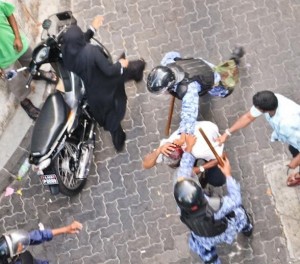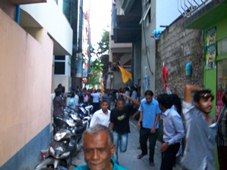Former Chairperson of the Maldivian Democratic Party (MDP) and lawyer, MP Mariya Ahmed Didi, has released a report claiming President Mohamed Waheed should face criminal charges for violating Article 30 of the Penal Code, for his alleged participation in unlawfully toppling the government of the Maldives.
Didi, who is an LLM graduate from the Aberystwyth University and the country’s first female lawyer, argued in her report that President Waheed played a “pivotal” role in the “unlawful overthrow” of former President Mohamed Nasheed’s administration on February 7.
The report is the second released by the now-opposition MDP, following the Aslam-Ameen report which interviewed police and military sources, and alleged that Nasheed’s government was toppled in a premeditated coup d’état through deliberate sabotage of the chain of command.
Didi however stated that the evidence for her report was drawn from the ‘timeline’ released by the government’s own three-member Commission of National Inquiry (CNI), and information collected from political forums and individuals.
The MP for Machangoalhi North stressed that while she had drawn on evidence from the CNI timeline, she still believed that it was not impartial or credible, as the information had come from the government itself.
Facing pressure from the Commonwealth, the government had agreed to reconstitute the panel to include a representative of former President Nasheed, a retired foreign judge, and UN and Commonwealth monitors.
Charges
MP Mariya Didi’s report alleges that President Waheed was personally culpable in the unlawful toppling of the Maldives’ government, which is punishable by law under articles 30 and 33 of the Penal Code. The punishment for such an offence includes life imprisonment or banishment for life, including a period of “hard labour” as determined by the sentencing judge.
Article 30 of the Penal Code states: “The punishment for a person who plots to remove the president or topple the government by the use of unlawful weapon (weapons that could harm a person) is imprisonment for life or banishment for life and the Judge has the authority to decide a period for rigorous imprisonment while the person serves the sentence.”
Article 33 of the Penal Code states: “Articles 30, 31 and 32 includes all kinds of coup d’état and attempts of it.”
In her report, Didi stated that it was evident that former President Mohamed Nasheed was elected and sworn in as President, as both the head of state and the head of government on November, 11, 2008 for a term of five years under article 106(b) of the constitution and article 28(c) of the Penal Code.
The former MDP chairperson argued that there was no stipulation in the constitution dictating that the position of Vice President is an elected position, and that rather the VP is appointed by the elected President, both as his running mate and to the office if elected.
Didi further argued that as Waheed was appointed rather than elected, he was not eligible for presidential privileges under Article 127 of the constitution, which allow a criminal sentence to be delayed until the end of a president’s term if determined by a resolution passed by parliament.
Waheed had deviated from his mandate as Vice President while still in the position, Didi argued, as article 117(a) stipulates that, “The Vice President shall exercise such responsibilities and powers of the President as are delegated to him by the President.”
Evidence
According to point 14 of the CNI’s timeline, on January 30 Waheed met the members of the opposition coalition at the Vice President’s official residence after midnight.
“The Vice President met with some leaders of the [opposition] coalition on the night of 30 January 2012 at Hilaaleege, his residence. He was asked at the meeting whether he was prepared to carry out his legal responsibilities. He said he was ready to do so. Coalition leaders held a press conference after the meeting to announce their endorsement of the Vice President [for President],” the CNI timeline stated.
Didi claimed that after the meeting on January 30, other members of the cabinet had asked Waheed about his meeting with opposition but he had refused to reveal any details.
She argued that this was against the spirit of the article 117(a) of the constitution since the Vice President’s duties were only those delegated to him by the president, and that he had no authority to hide any information which he had acquired in his capacity as the vice president.
In her report, Didi stated that given the midnight meeting and background of anti-government protests calling for the toppling of the government, she inferred the details of the forthcoming ‘coup’ were delivered to Waheed as he had succeeded to power on February 7 without any inquiry as to what had actually happened.
Waheed’s acknowledgement of the resignation amid the police and military mutiny, and formation of a ‘national unity government’ consisting largely of the accused opposition parties, was sufficient evidence that Waheed had accepted his role in the plot to topple Nasheed.
Five days later
Point 17 of the CNI timeline states: “Following Coalition discussions, protests began at Artificial Beach on 2 February 2012. At the protest, Adhaalath Party leader Sheikh Imran Abdulla calls for police to arrest President Nasheed within five days.”
Didi observed that five days after Imran called for the arrest of Nasheed, Nasheed had resigned and Waheed had been sworn into office.
She argued that the only way a president could be removed from office under the Maldivian constitution was through an election, death, voluntary resignation or parliamentary resolution under article 100(a) of the constitution, requiring a two-thirds majority of the chamber.
The article 100(a) states: “The People’s Majlis, by a resolution, may remove the President or the Vice President from office only on the grounds of:
1. Direct violation of a tenet of Islam, the Constitution or law;
2. Serious misconduct unsuited to the office of the President or Vice President; or
3. Inability to perform the responsibilities of office of President or Vice President”
Didi submitted in her report a statement given by Waheed to Villa TV on February 7, between 2:00am and 3:00am, which was mentioned in point 90 of the CNI timeline.
Point 90 of the timeline states: “The Vice President speaking via the media at his residence in Hilaaleege called on the military and the police not to obey any illegal orders: ‘Yes! It is also my duty to say something at a time of such national crisis. I support the peaceful activities of the many to protect the country’s constitution and its faith. It is important at this time that all Maldivian institutions especially those of law enforcement to protect and maintain the Constitution and laws. I call upon everyone not to obey an illegal order. In this sorrowful time, I also call upon the Maldivian security services not to leave room for those seeking to dissolve our security and not to allow any harm to be caused to people and their property, especially the media. It saddens me very much that VTV and other places have been damaged tonight. I call upon those who cause such damage to refrain from doing so. I also assure you that I will do everything I can as the Vice President of this country to free us from this dangerous and tragic time. May Allah return our country to a peaceful and secure state, Amen.’”
Didi claimed that the live TV statement was in violation of article 117 of the constitution, in which the Vice President’s duties included only those delegated to him, and that Waheed in the capacity of Vice President had no right to give such a statement encouraging anti-government activities.
She further argued that when Waheed said that he supported “the peaceful activities”, point 15 of the timeline revealed that a police officer had been set on fire during the protests.
Point 15 of the timeline states: “A policeman caught fire on 31 January 2012 when a fireball was thrown at the police during the protests near MMA.”
She also pointed out in her report that a journalist from the state broadcaster, Moosa Naushad, had his arm broken after a protester hit him with a wooden stick.
She further stated that the timeline acknowledged that police and protesters had damaged public property and vandalised the MDP ‘Haruge’, and also had also uprooted the city council’s date palms to use as weapons.
Didi stated that despite all these violent activities, Waheed had done nothing to prevent such actions or defuse the situation, but had instead supported the cause of the anti-government demonstrators. This, she contended, indicated that he was a part of the plot.
Didi also alleged that Waheed was involved in the unlawful storming of the state broadcaster by police, military and opposition demonstrators prior to Nasheed’s resignation. She said it was “fishy” that Waheed was so concerned about VTV that he had specifically mentioned the television station’s name in his media statement, but had failed to take any action or make a statement following the raid on MNBC.
She further claimed that it was Waheed’s own brother, Ali Waheed, who had accompanied the rebelling police to take over the station.
Didi stated that Waheed did not try to contact Nasheed even as the situation in the country worsened. Police had openly called that they were ready to confront the military, and two civilians – Abdullah Riyaz (current Commissioner of Police) and Mohamed Nazim (current Defence Minister) – had entered the military barracks and demanded the unconditional resignation of President Nasheed, and ordered him to delegate his powers to the Vice President.
She claimed that such Waheed’s decision not to contact Nasheed at the time implied that he was in support of the unlawful activities.
Didi also claimed that Waheed’s failure to contact Nasheed about what had happened or ask why he had resigned before taking the oath of presidency at 15:25pm on February 7, added further weight to the suggestion that he was part of the plot.
She also alleged that the consistent failure of Waheed’s new government to take action against the rebelling police officers for criminal offences – including the distribution of police weaponry to civilian protesters – clearly denoted Waheed’s part in the coup.
In conclusion, she called on the judges and the Prosecutor General to look into the report and deliver justice to the people of the country.
Government response
Spokesperson of the President’s Office, Abbas Adil Riza told Minivan News that the government welcomed such a “professional” report.
While the government has described the Ameen-Aslam report as a “terrorist act”, Riza said that Didi’s report was a “professional opinion” while the former was “twisted and baseless accusations against police and military officers.”
“It is very good that people like Mariya have decided to abandon their ‘street justice’ and get into the boundaries of the country’s legal system,” he said.
“This may not mean that they have entered into the legal boundary but it is a positive thing. I think it is a step taken towards getting inside the law,” he added.
Riza further stated that the report was Didi’s own opinion, however he said the government would respect any decision made by the courts.
Likes (1)Dislikes
(1)Dislikes (0)
(0)  While riot police baton-charged the front line of protesters on February 8, Minivan News observed riot police also charging the crowd from a narrow alley leading to the Maldives Monetary Authority (MMA) area.
While riot police baton-charged the front line of protesters on February 8, Minivan News observed riot police also charging the crowd from a narrow alley leading to the Maldives Monetary Authority (MMA) area.